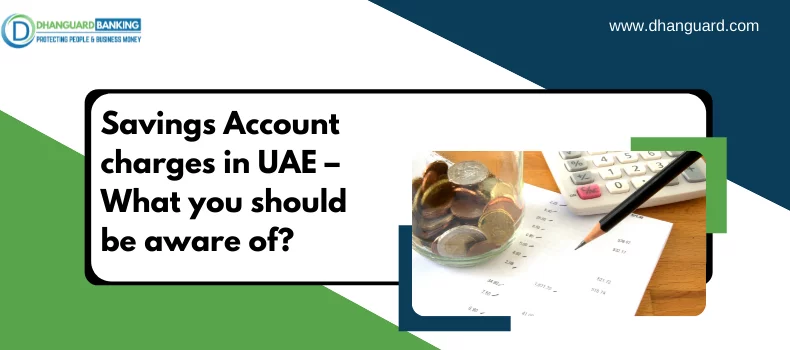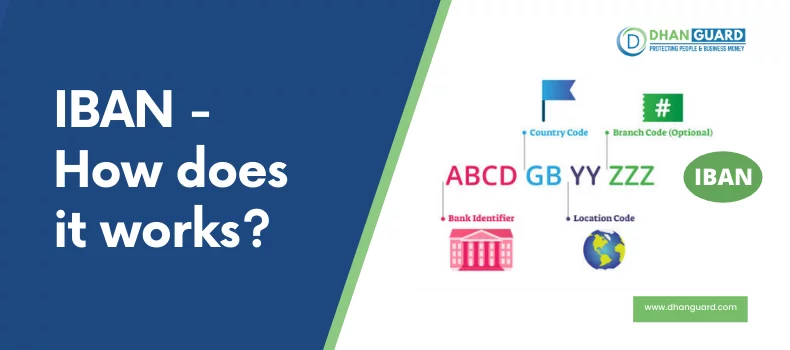Every person who makes a living will keep a Saving Account. A savings account offers a number of advantages. The primary advantage of a savings account is the security it provides for your money, in addition to the low interest rates. When applying for a savings account, the majority of applicants look at the account's benefits. However, in addition to the benefits, applicants or account holders must understand the fees and charges that are charged on your account activity. Let’s read this blog thoroughly and understand how Dhanguard will provide you with the knowledge about different Saving Account Charges in UAE.
Charges Applicable for Saving Account in UAE
List of Saving Account Charges are mentioned below

Monthly Charges
Banks impose a monthly fee to keep the account open. Bank accounts typically have a condition for maintaining a minimum balance in the account. If the account holder fails to maintain the minimum balance as indicated, banks will charge a monthly fee ranging from AED 25 to AED 200, depending on the account.
Before applying for a bank account, applicants should familiarize themselves with the account's basic characteristics. Banks often offer zero balance savings accounts, which can help you avoid monthly fees or fall below the charge threshold.
Withdrawal Charges
Banks typically provide a free debit card and cheque book with a savings account. Even if a debit card is supplied free of charge, there are various fees incurred when funds are withdrawn using the card. ATM withdrawal fees can range from AED 1 to AED 50. Some bank accounts in the UAE, such as the Mashreq Savings account, allow for a certain number of free withdrawals per month. Withdrawal fees apply once the maximum withdrawal limit has been reached.
Transaction Charges
As previously stated, the free debit card comes with some fees. Banks levy a tiny percentage of the transaction value. So, before making purchases with your debit card, be sure you understand the fees that will be applied to your transaction.
Remittances Charges
Because the UAE has the highest expat population, there is a large quantity of remittances that occur on a regular basis. This overseas transfer includes currency conversion fees in addition to service expenses. Every month, several banks provide 1-2 free remittances. Account applicants who often move money internationally should be aware of these fees.
Account Statement Charges
A bank account statement provides a clear picture of your in-and-out transactions. On the given statement, you can review the transactions made on your account. These statements will be necessary, particularly when applying for a loan or credit card. Banks charge a fee of roughly AED 25 – AED 30 (per month statement) to supply printed statements. They also provide e-statements, which may be accessed via net banking. Bank account e-statements are available for free.
Read more :- What is IBAN Number and How does it works ?
Account Closure Charges
If the account holder wishes to close his existing savings accounts in the UAE, there are several fees that must be paid. If the account holder wishes to shut the account within one year of its opening, he or she must pay account closure fees. Most banks will impose a fee of AED 100 to close an account.
Aside from this, there may be other charges on a savings account depending on the bank and account type. All of these fees are avoidable if the account is properly maintained. Being aware of these fees can assist you in adhering to the bank's guidelines and saving money on these fees.
Foreign Exchange Charge
These fees are applied to Credit Card purchases made abroad or in a different currency. They typically range from 1% to 3% of the transaction value. Visa and MasterCard will also charge you a conversion fee. If you are a regular traveller looking for a travel credit card, make sure to verify this cost before applying.
Standing Instruction Charge
Check the fees connected with setting up a regular standing instruction or order for payments towards utility bills, loan repayments, or rent. The majority of banks in the UAE charge roughly AED 50 to put up a standing instruction. Make sure you have enough money in your account for the due date of the standing instruction transaction. If your transaction is initially rejected owing to a lack of funds, you will be charged about AED 25 per failed transaction.
ATM Withdrawal Charge
Avoid making ATM cash withdrawals from banks other than your own. For cash withdrawals from ATMs held by other banks both inside and outside the UAE, banks charge a standard fee. When you use another bank's ATM in the UAE, for example, you will be charged AED 2 for cash withdrawals and AED 1 for balance enquiries. If you use another bank's ATM in the GCC, you will be charged AED 6 for cash withdrawals and AED 3 for balance enquiries. Withdrawing money from any other overseas ATM costs AED 20 plus a 2% transaction fee.
Why is it Important to Read the Fine Print?
Request and read all of the account's details when you open one. Many customers sign account and plan documents without properly comprehending what they are agreeing to.Some banks may have a minimum balance requirement in their savings account. Failure to have that amount on hand may result in costs or a lower interest rate. Check the terms and conditions, read the fine print, and see if there is a minimum balance requirement or any restrictions on moving money into or out of your savings account, whether by the branch, an ATM, or electronic transfer.
Conclusion
The charges mentioned above may differ between banks and account types. So, when you choose a savings account, carefully review the schedule of relevant costs to ensure that your savings remain intact. If you already have a savings account, you can check the charges on the bank's website. Most importantly, pay extra attention and avoid paying additional fees unless absolutely necessary. Open a savings account only after thorough research. Before opening an account, make sure that you are informed of all charges and fees, as well as the related terms and conditions, in addition to the advantages and incentives.
Dhanguard assists clients in opening bank accounts in a variety of jurisdictions, but we specialise in opening personal and corporate bank accounts in the United Arab Emirates.
DhanGuard: All-in-One Solution for Business Setup in Dubai, UAE
DhanGuard is your ultimate one-stop solution for all your business needs. Whether you’re planning to set up a new company or expand your existing business in the UAE, we’ve got you covered with our comprehensive range of services. From Company Formation in UAE and Business Bank Account in UAE services to managing your financial and legal compliance, we provide everything you need under one roof.
Our services include:
- Company Formation in UAE and Dubai
- Opening a Business Bank Account in UAE and Dubai with a 99% success rate
- VAT & Corporate Tax Compliance
- Accounting, Bookkeeping, and Auditing Services
- Trade License Renewal
- Golden Visa Assistance
Let DhanGuard make your journey of Business Setup in Dubai seamless and hassle-free!







